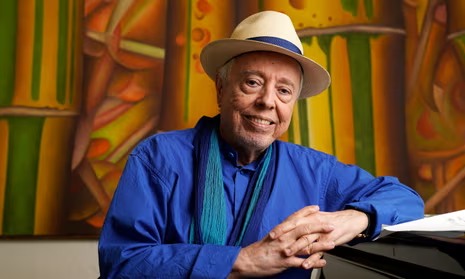
Sérgio Mendes (February 11, 1941 – September 5, 2024) was a celebrated Brazilian musician, composer, and producer who achieved international fame for his work in bossa nova, samba, and Brazilian jazz. Mendes’s career, which spanned over six decades, left an indelible mark on the global music landscape, blending the sounds of Brazil with jazz, pop, and contemporary rhythms, helping to popularize Brazilian music worldwide.
Early Life and Musical Roots
Sérgio Santos Mendes was born in Niterói, a coastal city in the state of Rio de Janeiro, Brazil. From an early age, he was deeply influenced by the rich musical traditions of his homeland, including samba and bossa nova, the latter being a genre that emerged in the late 1950s and fused samba rhythms with jazz influences. Mendes initially pursued a formal education in classical music, studying piano at the local conservatory. However, his passion for popular music, particularly the burgeoning bossa nova movement led by artists like João Gilberto and Antonio Carlos Jobim, eventually shifted his focus toward a different path.
Rise to Prominence in the 1960s
In the early 1960s, Mendes became a part of the thriving bossa nova scene in Rio de Janeiro. He worked as a session musician, playing with bossa nova legends such as Jobim and Gilberto, while also leading his own band, the Sexteto Bossa Rio. Mendes’s early albums, such as Dance Moderno (1961), showcased his ability to blend traditional Brazilian rhythms with modern jazz influences, earning him recognition in Brazil’s music circles. He quickly developed a reputation as an exceptional pianist with a distinctive style that seamlessly integrated Brazilian and American musical sensibilities.
By the mid-1960s, Mendes had set his sights on expanding his reach beyond Brazil. He moved to the United States, where bossa nova had gained significant popularity, largely due to the success of Jobim and Gilberto’s collaborations with American jazz musicians like Stan Getz. Mendes formed a new band, Brasil ’65, which toured the U.S. and recorded albums that received moderate success. However, it wasn’t until he rebranded the group as Sergio Mendes & Brasil ’66 that he found his breakthrough.
Breakthrough with Brasil ’66
Sergio Mendes & Brasil ’66 became a sensation with their innovative fusion of Brazilian bossa nova, jazz, and American pop music. The group’s eponymous debut album, Herb Alpert Presents Sergio Mendes & Brasil ’66 (1966), produced by the legendary Herb Alpert, marked a turning point in Mendes’s career. The album’s lead single, a bossa nova-flavored cover of Jorge Ben Jor’s “Mas Que Nada,” became a major hit in the United States and around the world. The success of “Mas Que Nada” catapulted Mendes to international fame, and the song remains one of his signature pieces.
Brasil ’66’s sound was characterized by lush harmonies, intricate arrangements, and the dual vocals of Lani Hall and Janis Hansen, which provided a sophisticated contrast to the rhythmic Brazilian beats. The band’s music resonated with American and global audiences, largely due to Mendes’s ability to bridge the gap between the exotic, sensual sounds of Brazilian music and the more accessible pop melodies of the time. The group’s music was featured on mainstream radio stations, and they made numerous television appearances, including memorable performances on The Ed Sullivan Show and The Tonight Show Starring Johnny Carson.
Mendes and Brasil ’66 followed their debut with several successful albums throughout the late 1960s and early 1970s, including Equinox (1967) and Look Around (1968), which featured hits like “The Fool on the Hill,” a Beatles cover that became a staple of their repertoire. Mendes’s covers of popular songs by artists like the Beatles and Burt Bacharach, infused with bossa nova rhythms and Brazilian instrumentation, became his trademark and contributed significantly to his crossover appeal.
Evolution in the 1970s and 1980s
In the 1970s, Mendes continued to evolve musically, adapting to changing tastes while staying true to his Brazilian roots. As disco, funk, and rock gained popularity, he incorporated elements of these genres into his music. Albums such as Primal Roots (1972) and Sergio Mendes (1975) showcased a deeper exploration of Brazilian folk traditions alongside contemporary sounds, demonstrating Mendes’s versatility as an artist. However, the music scene was rapidly changing, and while Mendes remained a respected figure, the global bossa nova craze had diminished by this point.
In the 1980s, Mendes reinvented his sound once again, this time embracing the vibrant sounds of synth-pop, R&B, and dance music. His 1983 album Sergio Mendes included the hit single “Never Gonna Let You Go,” which climbed the Billboard charts and became one of his biggest hits in the U.S. Mendes’s ability to continuously adapt to new musical trends while retaining the essence of Brazilian music kept him relevant throughout the decades.
Resurgence in the 1990s and 2000s
Sérgio Mendes’s career experienced a resurgence in the 1990s and 2000s as a new generation of listeners rediscovered his music. In 1992, Mendes released Brasileiro, which marked a return to his Brazilian roots and earned him a Grammy Award for Best World Music Album. The album was a vibrant celebration of Brazilian culture, blending traditional samba rhythms with modern production techniques.
Mendes also embraced collaboration with contemporary artists, helping to introduce his music to younger audiences. In 2006, he released Timeless, an album produced by will.i.am of The Black Eyed Peas, which featured collaborations with artists such as Justin Timberlake, Erykah Badu, and John Legend. Timeless was a commercial and critical success, and the updated version of “Mas Que Nada,” featuring will.i.am, became a global hit once again, demonstrating Mendes’s enduring influence and ability to transcend generational boundaries.

Influence and Legacy
Sérgio Mendes’s contributions to music extend far beyond his commercial success. As one of the key figures responsible for popularizing Brazilian music internationally, he played a pivotal role in introducing bossa nova and samba to audiences around the world. His fusion of Brazilian rhythms with jazz, pop, and R&B created a unique sound that transcended cultural and linguistic barriers, earning him a place in the pantheon of global music icons.
Mendes’s work was deeply rooted in his Brazilian identity, but his openness to experimentation and collaboration allowed his music to resonate across cultures. His ability to collaborate with artists from diverse musical backgrounds, whether through his work with jazz legends in the 1960s or hip-hop artists in the 2000s, is a testament to his artistic vision and adaptability.
Throughout his career, Mendes received numerous accolades, including Grammy Awards, Latin Grammy Awards, and a star on the Hollywood Walk of Fame. His influence can be heard in the work of countless musicians who have drawn inspiration from Brazilian music and its fusion with contemporary genres.
Death and Final Legacy
Sérgio Mendes passed away on September 5, 2024, at the age of 83. His death marked the end of an era for Brazilian music and the broader world of Latin-infused global sounds. However, his legacy endures through his extensive body of work and the generations of musicians he inspired. From his groundbreaking work with Brasil ’66 to his reinvention in the 21st century, Mendes’s contributions to music will be remembered as a shining example of cultural fusion and artistic innovation.
In a career that spanned over six decades, Sérgio Mendes not only brought the music of Brazil to the world but also reshaped it, ensuring its place in the global musical consciousness. His dedication to his craft, his country, and his ability to evolve with the times secured his place as one of the most influential musicians of his time.
Check out Sérgio Mendes on Amazon.
.

